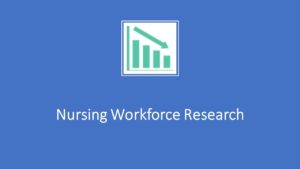By Rose O. Sherman, EdD, RN, NEA-BC, FAAN
When the COVID-19 Pandemic finally ends, we need to take a very close look at what the impact has been on the nursing profession. Many questions will be important to study at a national level. But here is the sad, cold, hard truth. This research probably will not happen. I do not say this to be pessimistic but rather as a knowledgeable emeritus tenured university professor and the 2018 American Organization of Nurse Leaders Research of the Year.
My academic colleagues in the Association of Leadership Science in Nursing (ALSN) will be quick to tell you about the struggles they have in obtaining any federal dollars to study the science of nursing leadership and nursing workforce issues. Most of their work ends up funded with small intramural or foundation grants. Even the HRSA Nursing Workforce study, which provided valuable data for many years, was defunded. Most information about the nursing workforce today is drawn from the census, Bureau of Labor statistics, or studies conducted by staffing solution firms. Research that looks at other issues such as staffing, nurse competencies, and resilience is rarely done at a national level.
Universities and Deans, like most organizations, follow the money in designing programs and hiring faculty. A lack of research funding in areas like leadership and workforce is why there are so few nursing administration research faculty positions. This underfunding is incredible when you consider how fundamental leadership is to the creation of high-quality healthcare environments. If we have learned anything from our experiences with COVID-19, it should be that strong nursing leadership matters. It has taken an enormous amount of innovative thinking and agility to move quickly to plan for surge staffing, redeploy staff, open ICUs overnight, and calm the fears of a very stressed nursing workforce. I am not aware of any real-time national studies looking at the nursing response to COVID-19 that are being conducted at this time.
For years, many prominent nurse leaders in academic settings have been dismissive of research work that looks at the workforce and leadership in general. Doctoral students often receive strong messages that they cannot focus their dissertation work in these areas. Yet on many levels, as we have seen in COVID-19, it is the care given by nurses on the frontline that captured the attention of the public and moved the needle for so many patients. Understanding their experiences will be an essential part of future crisis planning. We don’t know yet how this experience will impact nurse resilience, retention, and future recruitment.
When I look at how federal nursing research dollars in the US today is spent, I believe that the strategic priorities may be misaligned. While I think a well-funded area like precision medicine is great in theory, as was recently pointed out in a Wall Street Journal article, it was certainly not a focus during this pandemic. Primary care delivery, while important and a focus of funded research in nursing has barely been mentioned in this crisis.
A well known senior nurse scientist once told me that nurse researchers should not study nursing issues or nursing education. This type of research, she explained, does not move the science of nursing forward. This point of view may have been relevant at some point in time, but no longer is. We need to study what happened here with our nurses – the future of the profession depends on it.
Read Rose Sherman’s book – The Nurse Leader Coach: Become the Boss No One Wants to Leave
© emergingrnleader.com 2020



 LinkedIn
LinkedIn Instagram
Instagram